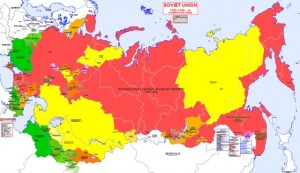(( Soviet Union 1922-1928 : Socialist republics – National powers. Digital image. Hisatlas – Map of Soviet Union 1922-1928. Accessed February 21, 2016. http://www.euratlas.net/history/hisatlas/ussr/192822URSS.html. ))
During the Russian Civil War, nationalist uprisings and criticisms left Bolshevik leadership with some important questions and decisions to make. They had to determine whether to grant different ethnicities and nationalities sovereignty, how to cope with those that did not receive as such, and how to make the union of soviet socialist republics stronger and well-connected. Both Lenin and Stalin, in the form of personal writing, shared their thoughts on these issues.
Lenin seemed to take an approach not too dissimilar to the ancient Romans: when ruling over another group of people, keep their systems and leadership intact, so long as they provided troops and worked within the greater economic system.[1] Lenin understood that to oppress a minority population led to resentment and an unwillingness to work with the system in place. Furthermore, he claimed to see beyond nationalities in a sense, declaring being a proletariat the superior identifying characteristic. Moreover, if groups worked together long enough, their origins will cease to matter.
Stalin argued in a similar manner, but used Western and pseudo-socialist nations to juxtapose where his Communist ideology was superior.[2] He criticized the others for being hypocritical in its views towards imperialism: while they were willing to allow for “self-determination” of their colonies, they refused to acknowledge the similar poor treatment minorities received in the home countries. Furthermore, Stalin criticized the other countries’ warping of “self-determination” to the point where a minority ethnicity or nationality could receive their cultural freedom, but still essentially had to maintain political and economic submission to the mother country. Stalin also asserted the fusion of nationalist revolution against colonialism and imperialism with proletariat revolution against capitalism.
However, what Stalin failed to acknowledge were the minority groups under control of Russia at the time.[3] He avoided discussing the people of Georgia, Armenia, and the like. Perhaps because Stalin himself was Georgian and had managed to become a higher up in the Bolshevik Party, he saw no reason for Georgians not to be a part of Russia. In any case, it is at this point where Stalin differed from Lenin, leading to a course of action in which Lenin eventually condemns Stalin in his writing. Lenin acknowledged the nationality differences within the future USSR, and seemed to prepare to figure out how to solve the problem.
That being said:
- Lenin dictated that being a proletariat in a communist mindset superseded all other forms of identification. In a capitalist system, what gets valued more – economic class or nationality? Does it depend on the class?
- Lenin and Stalin wrote these points during the Russian Civil War. Do you think their points would have changed had they been written afterwards?
- How did Stalin’s attacks on imperialism fit into the global context at the time (1921)?
[1] Lenin, Vladimir Ilyich. “Lenin on Nationality Policy.” Seventeen Moments in Soviet History. 2015. Accessed February 21, 2016. http://soviethistory.msu.edu/1921-2/transcaucasia/transcaucasia-texts/lenin-on-nationality-policy/.
[2] Stalin, Joseph. “The Presentation of the National Question.” The Presentation of the National Question. Accessed February 21, 2016. http://marx2mao.phpwebhosting.com/Stalin/CPNQ21.html.
[3] Stalin wrote in 1921, meaning that it was still Russia at the time.

